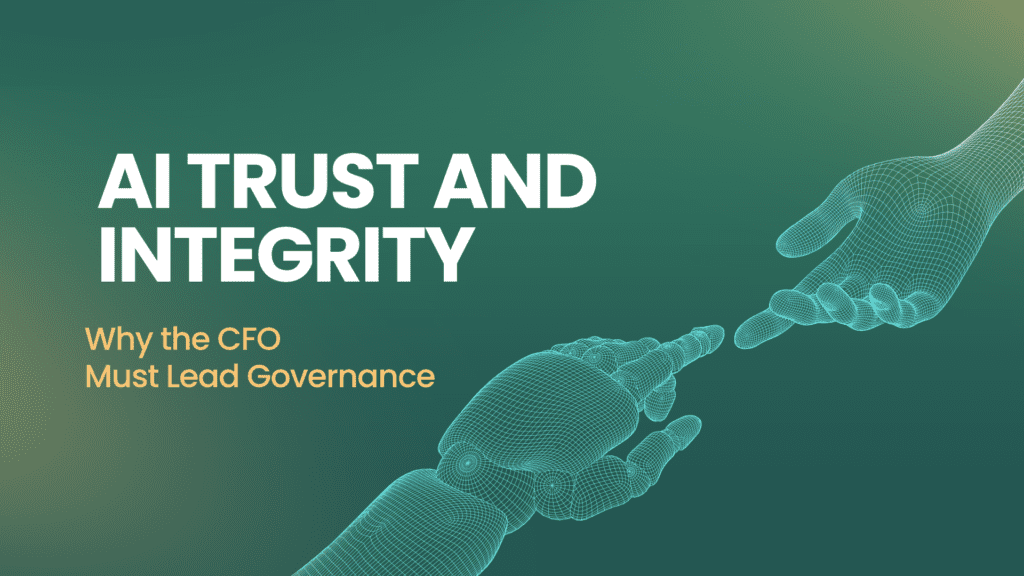AI Trust and Integrity: Why the CFO Must Lead Governance

Artificial Intelligence (AI) is rapidly transforming the business world, offering unprecedented opportunities for efficiency, innovation, and strategic advantage. However, with this power comes the critical need for trust and integrity in AI systems. For Chief Financial Officers (CFOs), ensuring that AI is used responsibly and ethically is not just a matter of compliance—it’s a strategic imperative that directly impacts financial stability and long-term success.
The Challenge of AI Trust
Concerns about its potential risks temper the excitement around AI’s capabilities. These risks can erode trust in AI within the organization and among stakeholders. Some key challenges include:
- Bias and Inaccuracy: AI algorithms can perpetuate or amplify existing biases if trained on flawed or unrepresentative data, leading to unfair or inaccurate outcomes. This is also compounded by “hallucinations,” where Generative AI (GenAI) can produce incorrect or inconsistent outputs.
- Lack of Transparency: Many AI systems operate as “black boxes,” making it difficult to understand how they make decisions. This lack of explainability can undermine trust, particularly in areas with regulatory scrutiny.
- Data Privacy and Security: AI relies heavily on data, and protecting sensitive financial information is crucial. Data breaches and privacy violations can severely damage an organization’s reputation and economic standing.
- Ethical Concerns: AI raises ethical dilemmas, such as the potential for job displacement, misuse of personal information, and algorithmic discrimination.
- Regulatory Compliance: The AI regulatory landscape rapidly evolves, creating uncertainty about acceptable use cases and accountability. This makes it challenging for organizations to comply with laws and industry standards.
The CFO’s Role in Establishing Effective AI Governance
CFOs are uniquely positioned to lead the charge in establishing robust AI governance frameworks. Their financial oversight, risk management expertise, and strategic mindset are essential for navigating the complexities of AI adoption. Here’s how CFOs can ensure AI is used responsibly:
- Financial Oversight: CFOs must allocate sufficient funds for AI initiatives while ensuring responsible spending. They should closely monitor AI costs, similar to how they manage cloud expenses, and track AI projects’ return on investment (ROI). CFOs must also develop metrics beyond productivity, focusing on business-relevant metrics like new revenue and improved customer experience.
- Risk Management: CFOs must proactively identify and assess AI-related risks, including ethical concerns, biases, data privacy issues, and regulatory non-compliance. They should develop risk mitigation strategies, such as establishing clear governance frameworks, data security protocols, and ethical guidelines.
- Strategic Planning: CFOs align AI investments with the organization’s strategic goals. They should focus on AI’s potential to create value beyond cost savings, such as generating new revenue streams, accelerating innovation, and improving competitive advantage.
- Governance Structures: CFOs must help establish clear AI governance structures, such as a central AI committee, to manage demand and ensure AI initiatives align with the organization’s strategic direction. This committee should include representatives from across the business and technical teams.
- Ethical AI Practices: CFOs should promote ethical AI practices, focusing on fairness, transparency, and accountability. This includes ensuring that AI systems are transparent and that stakeholders understand how decisions are made.
- Data Quality and Security: CFOs must ensure that data used in AI systems is secure, accessible, and well-managed. They should work with Chief Data Officers to implement strong data governance practices and ensure the organization has appropriate data privacy and security measures.
- Independent Validation: CFOs must ensure independent, ongoing validation of AI systems through internal audit teams or third-party specialists. This validation ensures that AI systems perform as intended and within ethical boundaries.
- Continuous Learning: CFOs must stay informed about evolving AI technologies and their potential impact on the organization. They should promote constant learning and adaptation, ensuring the organization remains agile despite the rapid technological change.
Key Takeaways
- Trust is paramount: AI’s potential can only be unlocked if stakeholders trust its integrity.
- CFOs are central. They have a unique vantage point to oversee AI’s financial implications and ethical considerations.
- Governance is essential: Effective governance frameworks are necessary to address risks and build trust in AI systems.
- A proactive approach: CFOs must establish governance to ensure that AI is used responsibly, ethically, and aligned with strategic objectives.
- Collaboration: CFOs must collaborate with other executives and business units to ensure a joined-up approach to AI implementation.
In conclusion, the CFO’s role is not just about managing the finances of AI but about ensuring its responsible and ethical implementation. By establishing robust governance frameworks, promoting transparency, and addressing potential risks, CFOs can build trust in AI and unlock its full potential to drive sustainable and responsible growth. The evolving nature of AI requires continuous adaptation, so CFOs must be prepared to learn and adjust to the changing landscape.






Responses